Welcome to the March 2023 issue of the Global Washington newsletter.
IN THIS ISSUE
- Letter from our Executive Director
- Issue Brief: Addressing Disabilities from the Ground Up
- Organization Profile: SightLife International Prevents Blindness and Restores Sight Around the World
- Goalmaker: Special Olympics’ David Evangelista on the Power of Vulnerability
- Welcome New Members
- GlobalWA Member Events
- Career Center
Letter from our Executive Director
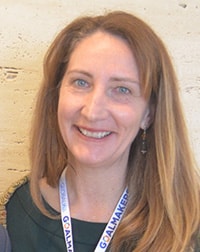
The words “inclusive development” can spark many concepts within the global development community. At Global Washington, our most recent conversation about inclusive development focused on the need to include diverse opinions from people with lived experience in program development. Inclusive development can also refer to the inclusion of women and girls in programs that are traditionally provided to men. Within this conversation, the concept of inclusivity as it applies to people with physical or mental disabilities is often overlooked.
However, there are several Global Washington members who are providing services, advocating, and changing health systems to improve the lives of people with disabilities. These organizations take a holistic approach to support the well-being of a person and not just addressing the disability. For example, breaking down barriers to education, improving healthcare infrastructure, and working with farmers on job safety protocols. Working with people with disabilities has catalyzed community-wide benefits and improved policy frameworks for inclusivity more broadly. Read more about these organizations in this issue campaign.
Also, I am thrilled to announce Global Washington’s new Strategic Plan that will move our organization from a learning network to an impact network. Over the past several months, Global Washington gained insights from our members and key stakeholders to determine what is needed and how Global Washington can contribute our convening power, network connections, and facilitation to advance the work of our members. We will be using the model of co-creation as we move forward with SDG working groups, Communities of Practice, and our future issue campaigns.
We hope you will join us on this journey. Click here to find out more.

Kristen Dailey
Executive Director
Issue Brief
Addressing Disabilities from the Ground Up
By Aneesh Chatterjee
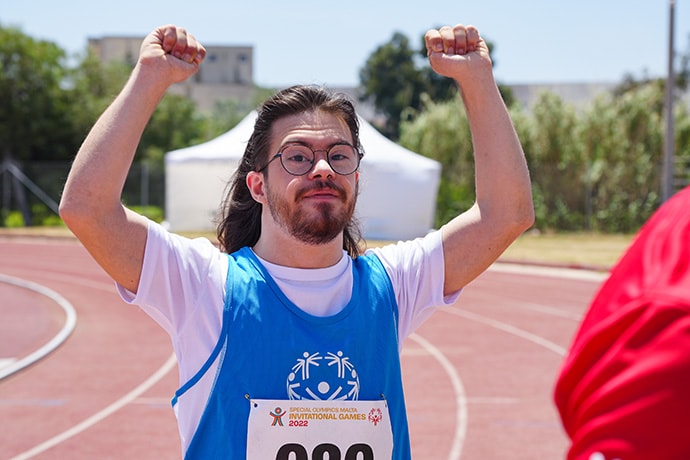
Athletics competition at the Special Olympics Malta Invitational Games 2022. Photo: Special Olympics
The first human rights treaty of the 21st century, the 2006 Convention on the Rights of Persons with Disabilities, was a milestone in the UN’s efforts to build the groundwork for fundamental human rights and freedoms. With the highest number of signatories on its opening day, the Convention carried the responsibility of not only affirming the essential human rights retained by persons with disabilities, but also changing attitudes regarding their value as autonomous human beings. A shift in how people with disabilities are perceived by organizations and governments is vital in addressing the unique barriers faced by them, which encapsulate not only physical and environmental limitations, but the distillation of language for clear communication, the political and regulatory norms that may impact them differently, and the preconceived notions that stigmatize and misinform. As the WHO estimates that up to 1.6 billion people worldwide may be afflicted with lifelong disabilities, efforts undertaken by organizations to acknowledge and address their unique circumstances are essential in achieving good health and wellbeing for all, the central pillar of SDG 3.
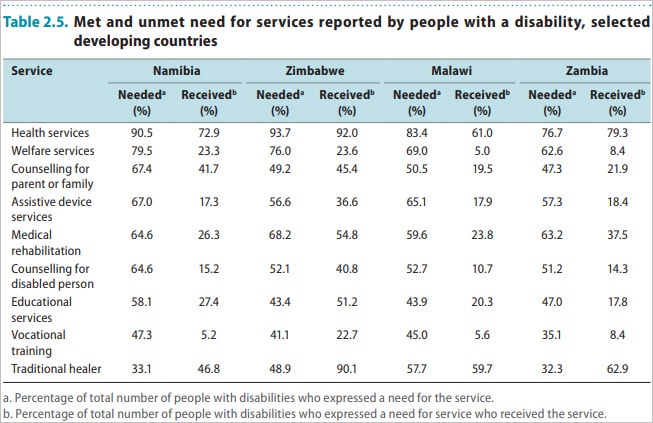
Excerpt from the World Report on Disability by WHO and The World Bank, p.66
The core tenets of the Convention – inclusion and autonomy – have facilitated the development of exemplary institutions such as the Special Olympics, an organization that supports Olympic-style sports training services for persons with disabilities across 170 countries. The provision of extensive and in-depth support for people with disabilities enables greater access to opportunity, and enables dynamic participation in communities. Additionally, oftentimes the initial health screening, from Special Olympics and SightLife for example, is the first opportunity disabled individuals have for a holistic health analysis.
The following GlobalWA members demonstrate their dedication to solving the significant crises faced by people with disabilities all over the world.
Tangible Solutions

The impact of the war in Ukraine has drawn the efforts of UNICEF USA in their endeavors to provide emergency services to civilians, ranging from medical assistance and sanitation to remote schooling and providing support for refugees. With over 14 million displaced persons as a result of the war, UNICEF’s efforts in relocation, rehabilitation and care have been vital to their recovery. Among these groups are children with disabilities – making up nearly 50% of displaced children in Ukrainian institutions before the war – with whom UNICEF has worked closely to foster stability and development.
27 children have been relocated from Ukraine to a residential placement center in Baicoi, Romania, ranging from 5 to 18 years of age. UNICEF has also supported the treatment of children with disabilities at the Dzherelo Children’s Rehabilitation Center in Lviv, where some refugees from Ukraine have also sought shelter. With a range of intellectual disabilities to address, such as autism spectrum disorder, primary rehabilitation goals have been to foster clear and effective communication strategies – such as the Picture Exchange Communication System (PECS), using visual cards to convey complex messages.
These examples underline the grander efforts undertaken by UNICEF to create safe and nurturing environments for children with disabilities impacted by the war. Mobile teams in government-controlled regions in Ukraine are providing physiological care to vulnerable groups, ranging from families with children to unaccompanied children. Specialized support teams with experience in assisting children with disabilities have worked with the government to establish easy access to vital services for children housed in institutions or returned to their families.
Working with UNHCR, UNICEF has organized Blue Dot hubs – transitionary safe spaces for displaced and unidentified victims of the war – which have been vital in assisting and registering children with disabilities, unaccompanied or with families. Proper registration enables support workers to connect these children with the appropriate services and institutions designed with disabilities in mind, reincorporate them into schools and make arrangements for care and treatment.

World Vision has also conducted multinational efforts to build better infrastructure and address the matter of disabilities. From 2014-2017, widespread efforts to address healthcare demands for persons with disabilities were encapsulated in the Accelerating Core Competencies for Effective Wheelchair Service and Support (ACCESS) program, implemented in Nicaragua, India, Kenya, El Salvador, and Romania. With the goals of working with local authorities and institutions to increase the service capacity of wheelchairs, broaden the range of wheelchair types available, and involve wheelchair users as active participants in society to a greater extent, World Vision connected persons with disabilities with trained and qualified service providers to increase quality of life and strengthen support infrastructure for disabilities. Through widespread data collection and qualitative evaluations of results, the program brought about a marked increase in mobility, independence, empowerment, and social participation. Tangible aspects – like the improved design of a wheelchair to be more versatile and easier to use, for instance – led to developments in the perceived efforts undertaken by persons with disabilities and their families, as ease of mobility enabled a reduction in caregiving commitment due to an increase in autonomy. In all five countries, statistical data revealed that social exclusion scores had decreased as a result of the ACCESS program, leading to greater inclusion of persons with disabilities in areas of work and communal participation.
World Vision has also been active in addressing disability challenges in other areas, such as the education sector. The Learning Roots and Unlock Literacy programs utilize USAID’s universal design approach to deliver education through multiple means of engagement, presentation of information, and versatile means of action and expression, allowing children with disabilities the freedom and flexibility they need to learn in ways that are best suited for them. The implementation of universal design in Malawi, for example, doubled the number of children with disabilities attending school.
In Columbia, World Vision’s Training, Economic Empowerment, Assistive Technology and Physical/Medical Rehabilitation (TEAM) projects led a comprehensive advocacy initiative for 2,749 persons with disabilities. Breaking down the precise challenges faced by those with disabilities – including delays and lack of appointments in healthcare, inaccessibility in public infrastructure and reduced career opportunities – a total of 175 measures were taken by Columbian authorities to address the concerns voiced through World Vision’s advocacy efforts.
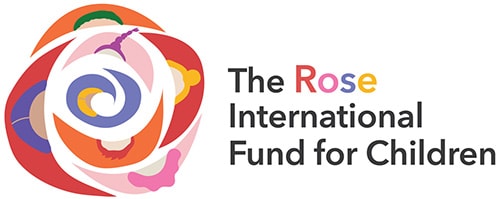
Another organization using a multi-sector approach is The Rose International Fund for Children (TRIFC), providing a variety of solutions for children with disabilities in Nepal. Through sponsorship programs, TRIFC funds medical aid, surgery and therapy, visual and hearing aids in educational settings, iPads with specialized software for non-verbal students, easily accessible sanitary products, and collaborations with local organizations, TRIFC aims to fortify and develop the education sector with a current focus on 75 sponsored children.
Beyond solutions to help children with disabilities thrive, TRIFC has also worked to address the prevalent stigma against disability in Nepal. Partnering with Rotary International, the three-year advocacy campaign that began in 2008 has worked to eliminate stigma and ensure a more supportive and welcoming community for children with disabilities.
TRIFC’s tactile learning solutions for visually impaired children, for example, introduced a series of braille-incorporated educational tools, puzzles, and learning games for blind students through partnerships with the Rotarack Club of Damak and AdSoN. The initiatives aim not only to improve quality of life and education for students, but encourage instructors to become more aware, and incorporate disabilities into their teaching methods. In other areas of focus, TRIFC has partnered with local hospitals to deliver over 75 crucial surgeries for children, in addition to physiotherapy and counselling services.

In the education sector, there is also the prevalent issue of bullying, where children with disabilities are particularly prone to being targets for harassment. The University of Washington, partnered with UNESCO, has inquired into the experiences of children with disabilities targeted by violence. Through multiple surveys conducted in the US, Canada, China, Sweden and other states, consistent patterns reveal that children with disabilities are more likely to experience bullying, harassment and violence from their peers and instructors. To combat this problem, the report recommends a nine-component model to education. Starting with political advocacy for awareness around disabilities through strong leadership, the model promotes the training of instructors to be more conscious and aware of disabilities in their classrooms – including redesigning curricula to better accommodate students. Safety in the classroom, both physical and psychological, may be improved through robust mechanisms for reporting harassment, with adequate support from authority figures, including instructors, parents, and the community at large. Finally, students should be empowered to succeed by opening opportunities via multiple partnerships between the education sector and other organizations.
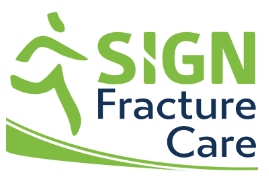
Disability due to trauma and injury is a field of concern for SIGN Fracture Care, which works across 57 countries to provide comprehensive orthopedic services, surgeries, and medical aid to injured persons who are unable to access healthcare. SIGN partners with local hospitals to provide innovative, low-cost solutions for medical equipment (such as surgical instruments and implants) needed to treat bone injuries, and orthopedic training for surgeons in low-capacity hospitals to broaden their healthcare proficiencies. By working with established hospitals and developing their capacities to treat patients with long-term injuries, SIGN has directly impacted over 400,000 patients.
In their most recent developments, SIGN has supplied 12 hospitals in Ukraine with crucial surgical equipment, supporting the recovery of up to 100 patients injured by shrapnel or gunfire. In the training and development sphere, SIGN Spine is a program to train surgeons on spinal surgery through hands-on seminars. Their exemplary work in providing effective surgical equipment – like the SIGN Nail – has not only broadened the capacities of medical institutions across the world, but also improved the health and livelihoods of individuals who were otherwise unable to access adequate healthcare.

Ocular disabilities call for the specialized approach provided by SightLife, with a mission to eradicate corneal blindness by 2040 – a condition affecting 12.7 million people across the world. Through training healthcare workers in the prevention of corneal blindness, providing effective corneal transplant programs to treat patients, and taking a systemic approach to revitalize the global healthcare approach to corneal blindness, SightLife employs a cross-sector focus. As of 2021, SightLife has facilitated over 27,000 corneal transplants, and trained 123 medical personnel in clinics and up to 900 frontline workers.
Policy and Philanthropy

Policy tools that state reasonable conduct standards are essential in constructing programs that serve children with disabilities. To that end, Save the Children’s Disability Inclusion Policy highlights the organization’s approach in nurturing children with disabilities worldwide. By advocating for the adoption of sensitive language when discussing or speaking to persons with disabilities, inculcating communication habits to employ at home, and promoting the enthusiastic advocacy for awareness around persons with disabilities, Save the Children takes a comprehensive stance in promoting values that make communication, inclusion, and social dynamics easier. As an example in practice, Save the Children Philippines has implemented Project SCOPE, an initiative to educate children with disabilities of their rights through interactive online learning.

Philanthropic initiatives by GlobalWA members have generated high-impact change in rebuilding traditional education networks for students with disabilities, especially in the wake of the pandemic. The Bill & Melinda Gates Foundation’s philanthropic lens has focused on addressing concerns around disabilities through their work with the National Center for Learning Disabilities (NCLD). Through extensive research, the NCLD offers insight on modern-day inclusive infrastructure, and how disparities in education delivery methods may be mitigated for children with disabilities. This includes the formulation of specific tools, such as the learning disability (LD) checklist, an interactive online exploratory tool designed to identify signs of potential learning disabilities in children in a broad range of age groups. Their research assess the current state of modern education and how LD considerations play a role, and provides essential insight for addressing shortcomings in a traditional education structure.
The NCLD promotes the inclusion of children with disabilities in school through academic awards such as the COVID-19 Impact Scholarship, the Allegra Ford Thomas Scholarship, the Everyday Champion Award, and the Anne Ford Scholarship. These awards are meant to not only allow greater opportunities for students, but also to encourage educators and administrators in schools to adopt LD considerations into their curricula, make an effort to connect with students, and create lasting impacts in their lives.
Advocacy also forms a cornerstone of the NCLD. In 2021, their endorsement of the Respond, Innovate, Succeed and Empower (RISE) Act – a document which, if passed, would allow for greater ease of access to post-secondary education for students with disabilities – demonstrates their commitment to driving real change. The RISE Act would generate more funding for assistance centers, enable a wider range of acceptable documentation to be considered for college accommodations, and create greater transparency in reports showing the number of accepted students with disabilities in colleges, and the accommodations granted to them. The RISE Act is one example of the NCLD’s advocacy work, which ranges from issues in literacy and mathematics to educator workforce development.
The Bill & Melinda Gates Foundation’s contributions to the NCLD, with the specific context of peak-pandemic distance learning for students with disabilities, have totaled $75,000 in April, 2020. The NCLD is also one of many institutions to receive funding from the Foundation: a sector-wide philanthropic initiative known as the Charter Students with Disabilities Pilot Community was granted $10 million in funding to improve educational infrastructure for students with disabilities across the US, with recipient organizations such as Ednovate, Eye to Eye, the Center for Special Education in Charter Schools, Uncommon Schools, Strive Prep, STEM Prep Schools, Summit Public Schools, the Noble Network of Charter Schools, and others.
GlobalWA members demonstrate the importance of including not only tangible, on-the-ground solutions for persons with disabilities, but widespread advocacy and infrastructure development to create a society more welcoming and inclusive. Initiatives have shown that the empowerment of persons with disabilities not only assists them in their personal struggles, but also enables them to become more active participants of society, thereby stimulating general growth and prosperity at a collective level.
In addition to the above organizations, the following GlobalWA members are working on disability healthcare, rights, and inclusion in communities where they work through their programs, addressing Good Health and Well-Being (SDG 3).
Adara Development
To support families and children with disabilities, Adara Development implements the Baby Ubuntu programme across three districts in Uganda. Baby Ubuntu aims to improve quality of life for children with moderate to severe disabilities and their caregivers.
In Uganda, there are very few resources for children with a disability. Parents often feel the difficult reality of raising a child with a disability such as isolation from community and coping with fewer resources. The programme provides emotional and practical support, empowering caregivers to maximise child development, health and quality of life. This community-based programme is led by healthcare workers and expert parents that have a child with a disability.
Baby Ubunutu was developed with the London School of Hygiene and Tropical Medicine. Baby Ubuntu sits in the ‘follow up and early intervention’ arm of our AdaraNewborn model.
In 2022, together with our collaborators, we published a paper on a trial of the Baby Ubuntu programme. The programme was found to be feasible and acceptable to children, caregivers and healthcare workers in Uganda.
We’re thrilled to see the positive impact that the Baby Ubuntu programme is having on children with neurodisabilities and their families, and are excited to see the programme grow and evolve.
Amplio
The Amplio Talking Book was designed with and for users with low literacy, but it also includes features to support people who are visually impaired. The device uses audio prompts and visual icons to guide the user. The audio can be recorded in any language. In addition, the icons on the user interface are embossed with a dot to aid listening in the dark or help guide people with visual impairment. When we attended the SBCC Summit in Morocco, a team from SightSavers asked to take a device home to field test. SightSavers – as the name would imply – works to eliminate avoidable blindness and promote the rights of people with disabilities. SightSavers Nigeria is considering the use of Talking Books to improve access to family planning for people with disabilities.
SIGN Fracture Care
Traffic accidents injure more than 20 million people every year, according to the World Health Organization. Without medical attention, injuries like bone fractures can easily turn into lifelong disabilities that cause pain and prevent people from returning to the workforce.
SIGN Fracture Care empowers surgeons in low-and middle-income countries to provide healing surgery for people with long bone fractures. SIGN provides orthopaedic education opportunities for surgeons, then manufactures and donates the orthopaedic instruments and implants needed to put the education into action.
The SIGN Nail is a stainless steel rod that is inserted into the fractured bone canal and fastened with screws. This stabilizes the broken bone so that it heals in the proper alignment and provides support so the injured person can walk the day after surgery. SIGN’s set of surgical instruments is designed specifically for austere hospital environments and does not rely on expensive hospital equipment or even electricity in the operating room—making orthopaedic surgery possible in rural clinics.
SIGN has trained more than 7,000 local surgeons and donated orthopaedic implants for more than 400,000 injured people since 1999.
World Vision
World Vision places a strong emphasis on people with disabilities. Disability inclusion is part of our overall gender equality and social inclusion approach for global health and other sectors. Our work on disability inclusion considers how gender and other social norms impact the situation for persons with disabilities. This means a focus on access to services and assets as well as enhanced well-being – by ensuring that protection and GBV prevention systems mitigate the increased risk of violence towards children and adults with disabilities. WV encourages participation within social, economic and political processes in their community and nationally. WV looks at decision-making at household, community and societal level – by raising up persons with disabilities and facilitating their ability to engage in decisions. Finally, we advocate for equal systems – by addressing stigma towards persons with disabilities in their communities and supporting community and national level advocacy. World Vision currently serves nearly 15,000 children with disabilities worldwide, with a goal of tripling that number in the next three years. World Vision is an inaugural member of the Excellence in Development and Disability Inclusion group. World Vision signed the Global Disability Summit Charter for Change and made 11 specific commitments to address disability inclusion.
Organization Profile
SightLife International Prevents Blindness and Restores Sight Around the World
By Tyler LePard
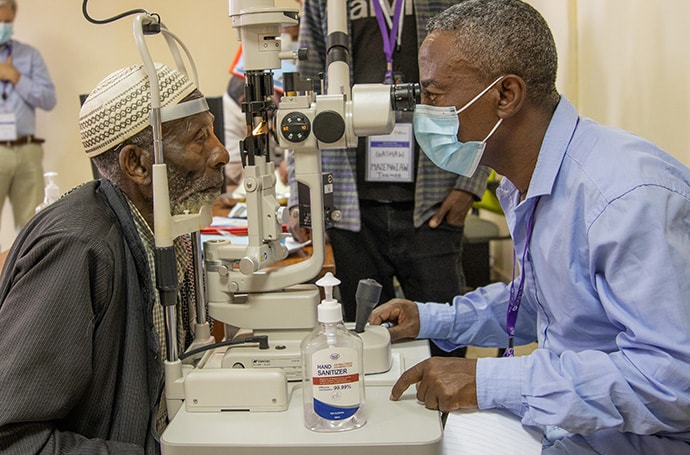
SightLife providing an eye exam. Photo © SightLife
Globally, more than 12.7 million men, women, and children needlessly suffer in the dark. Corneal blindness is preventable in approximately 80% of cases worldwide. In many instances, all it takes is a trained person and a few dollars’ worth of antibiotics to save a person’s eyesight.
SightLife International takes a health systems approach to addressing the inequities that contribute to and perpetuate corneal blindness worldwide, particularly in low- and middle-income countries. They draw on five decades of sight-restoring experience to expand the network, capacity, and capabilities of their partners globally, while also co-creating sustainable strategies and programs to improve corneal health outcomes in the regions they serve, from Africa to Greater Asia.
Most recently, SightLife International joined forces with HCP Cureblindness to make a greater global impact in eye care. Building on their shared commitment to training, while also combining HCP Cureblindness’ deep expertise in specialized care delivery and infrastructure development with SightLife International’s expertise in primary care and policy and advocacy, they will ensure millions of men, women, and children across Asia and Africa have access to the eye care they need to thrive.
The work of this leading global health organization started with humble beginnings as the Northwest Lions Eye Bank in 1969, which utilized volunteers from the local Lions Club to coordinate the gift of sight. These volunteers worked with families who lost loved ones to procure eye tissue so that others may see. After decades of meeting the local demand and recognizing the growing need in low- and middle-income countries, SightLife launched the International Programs in 2009. To date, SightLife International has been instrumental in restoring sight and preventing blindness for more than 225,000 individuals around the world and providing clinical training for more than 7,000 health care providers.
In a world designed for people who can see, good vision enables a range of everyday activities that are critical to global progress and the Sustainable Development Goals (SDGs), from reducing poverty and hunger to expanding opportunities for improved health, education, gender equality, and decent work. When the vision of a person is saved or restored, so is their independence and chance to stay in school, maintain employment, and provide for their family. By removing obstacles to appropriate and affordable corneal eye care across all stages of life, SightLife International and their partners not only help prevent blindness and restore sight, they renew hope for a brighter, more sustainable future for entire communities.
SightLife International addresses Good Health and Well-Being (SDG 3), through the integration of eye health into primary, secondary, and tertiary healthcare systems. Eye care is an essential part of universal access to healthcare. Therefore, SightLife International focuses on strategies to make eye care more accessible, leveraging existing solutions like training cadres of local community health workers.
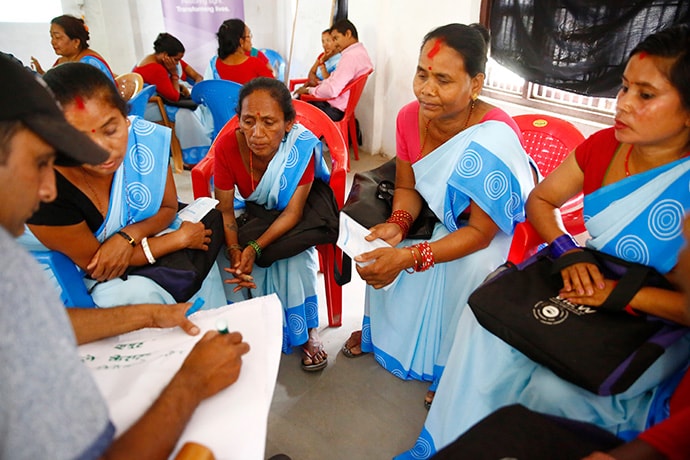
Community Health Workers in Nepal Receive First Aid Eye Care Training. Photo © Skanda Gautam
Like so many other health issues, there are preventable and treatable forms of corneal blindness. As SightLife International looks at their work in each country, they focus on the continuum of care. First, they enable community health workers to identify early cases and treat eye disease so it doesn’t progress. Preventing corneal blindness is the most cost-effective and yields the best patient outcomes, so they heavily focus programming on preventing blindness before it sets in. But not every case can be caught early, so they also train secondary and tertiary health care providers on best practices for treating and managing corneal disease and injury.
To prop up these strong health systems, SightLife International also works with governments to ensure there are policies in place that support eye donation systems and access to the full continuum of eye care.
There is a $5 return on every $1 spent tackling avoidable blindness. The data proves investments in primary healthcare make a long-term difference. That’s why SightLife International and their local partners advocate for the integration of corneal care within basic health care coverage. It’s also why their approach to eliminating corneal blindness prioritizes health systems strengthening—because even the best healthcare coverage and corneal care interventions can’t improve outcomes if they don’t reach people when and where they need them across all stages of life.
The COVID-19 pandemic was devastating to SightLife International’s work in 2020 because much of it focused on hospital settings and around obtaining donor tissue when someone dies – all of which came to a screeching halt so health care systems could focus on treating COVID patients. Their work in India, Nepal, and Ethiopia stopped for more than six months, leaving many patients waiting in darkness from corneal blindness.
However, SightLife International quickly pivoted its community-level work by training community health workers to not only assess and treat corneal abrasions, but also educate their neighbors on proper mask-wearing, hand washing, and other COVID prevention best practices. This led to an increase in patients seen by 25% in the first year of the pandemic.
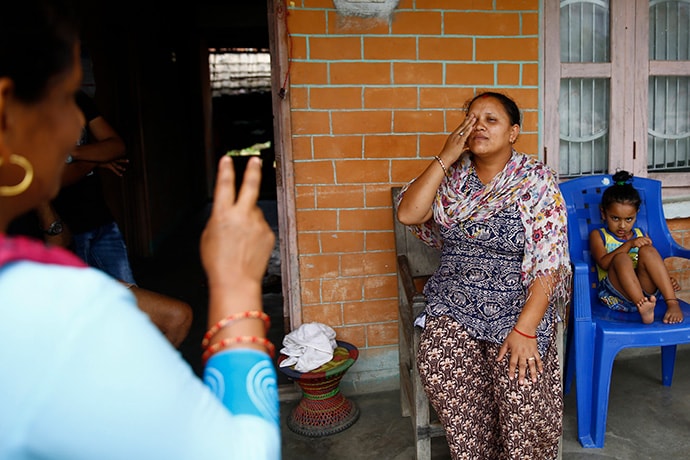
Community Health Worker Completing Vision Test. Photo © Skanda Gautam
Luckily, operations are now back up and functional across geographies. The silver lining that the pandemic prompted is that SightLife International learned how to pivot. In some ways, the pandemic helped move along the use of technology to support their work, including virtual clinical trainings for individuals from countries around the world. This allowed SightLife to emerge into the next phase of their training work, including a mixture of hands-on and distance work.
“SightLife International is always looking for new partners. One of the opportunities within the Global Washington community that we’re excited about is partnering with other organizations doing work internationally. We work on eye disease issues that heavily impacts farming communities, and individuals in labor, such as mining or construction. We’re interested in partnering with organizations that focus on building capacity among small-holder farmers or other individuals who work with their hands, to see how we can partner to prevent eye injury and ensure ready access to care,” said Josie Noah, Chief Global Officer for SightLife. “Simply put, we’re interested in partnering with other health organizations outside of the blindness community, to look at how we can integrate eye health into primary healthcare.”
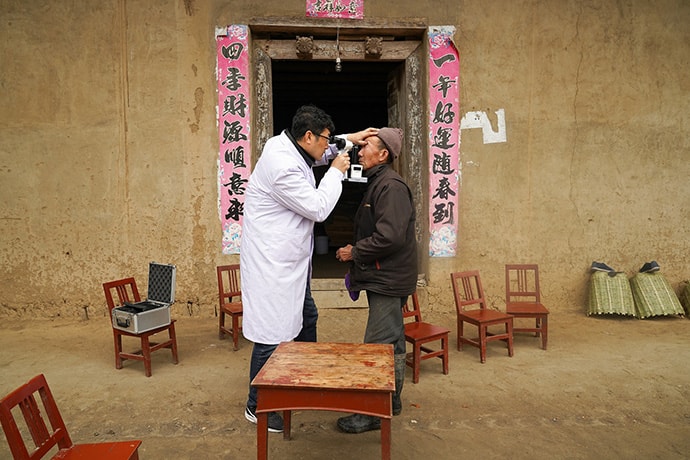
Ophthalmologist Examines Patient in Rural China. Photo © SightLife
As SightLife International and HCP Cureblindness fully integrate systems, programs, and brand over the next year, their work will have exponential impact. HCP is a Vermont-based global eye health organization focused on cataract blindness, which SightLife International has partnered with for more than 13 years. By combining the regions in which they each serve, their work can go farther, faster toward the mission of eliminating blindness due to cataracts – and now also corneal blindness – worldwide, which together impact nearly 70 million people globally.
“We’re excited about the power of partnership and our programs working side-by-side as one organization. We will undoubtedly restore hope and healing for more men, women, and children than ever before,” said Josie.
By clearing obstacles to improved corneal health outcomes, SightLife International and their partners transform lives. Together, they aim to ensure all people get the corneal care they need to stay in school, maintain independence, sustain a livelihood, and provide for their families.
Goalmaker
Special Olympics’ David Evangelista on the Power of Vulnerability
By Amber Cortes

Headshot of Special Olympics Europe Eurasia (SOEE) President David S. Evangelista. Photo: Special Olympics
David Evangelista is the first to admit it: when he started out, he was terrible at sports.
“In fact,” he says, “A very vivid memory of mine was my first ever time at bat, playing Little League Baseball. And the pitcher, whose name was Michael—I’ll never forget his first name, he was 12. And I was nine. And I got hit by a pitch. And I was so petrified to play baseball after that, that every time I went to bat, I jumped from the plate at every pitch.”
Until Evangelista learned how to bunt.
“I became the best bunter in the league. People talked about how David Evangelista- he might not be able to hit it. He might hit a triple to left field. But he’ll get a triple bunting because I was just scrappy. But I was also scared.”
Evangelista found his niche. But he also discovered something important—the sense of being completely vulnerable. And “understanding that in vulnerability comes great strength.”
“People with intellectual disabilities wake up every day knowing that the world is a tough place, and in many ways, makes them very vulnerable.” Evangelista explains. “This world punishes you for being vulnerable; but in the world of Special Olympics, it’s not only expected, but it is celebrated.”
Evangelista should know. His father started the Rhode Island Chapter of Special Olympics. Now, Evangelista is the President and Managing Director of Special Olympics Europe and Eurasia.
“And so, I was brought up unknowingly surrounded by an audacious belief that the world could be different, that we could be different. And that that difference could be very positive.”
But Evangelista didn’t connect the dots between sports and diplomacy until he attended the School of International Service at American University and realized that “there are mechanisms through which people can bridge the divide. And one of those most cost effective and most universal mechanisms is sports.”
Evangelista sees sports as an equalizer.
“It’s an opportunity to say, I might not be very good at math, but I can out dribble you. I might not be very fast in biology, but you can’t beat me on the track. It’s an equalizer. It gives people an opportunity to demonstrate their skills in another forum.”
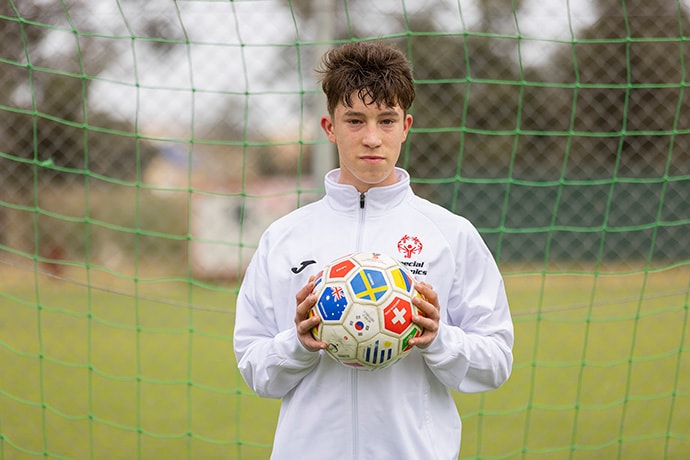
Special Olympics (SO) athlete at the Malta Invitational Games 2022. Photo: Special Olympics
The movement of Special Olympics, the world’s largest sports organization for people with intellectual disabilities, has been providing that forum for over 50 years. Its origins are humble, local. Special Olympics founder, the late Eunice Kennedy Shriver, started the movement by organizing local sporting events.
Now, the international organization hosts over 150,000 competitions a year in 190 countries. Most of those countries are low and middle income; in fact, 72% of Special Olympics athletes are from low to middle income countries.
For those athletes and their families, Evangelista says, Special Olympics is about so much more than sports alone, but instead represents an inclusive development platform that brings so much to so many.
“Throughout my travels, I have had the privilege of speaking to many families, local officials, athletes and partners. It is clear that in many ways, sports offers an invitation to key development aims: education, health care access, social protection, safeguarding, and more.”
“That’s when I began to realize the brilliance of what Mrs. Shriver created. Through sport, she ushered in a completely redefined platform of diplomacy,” explains Evangelista.
“To see a population, and to empower it and not stop until every community, every school, every clinic, every youth center, is inclusive- that’s a powerful energy that is often very contagious, positively infectious!”
In his role, Evangelista oversees the programming of 58 national Special Olympic organizations across Europe and Eurasia, focusing on strategic positioning, revenue generation, and partner relations. He enjoys the dynamism of working within different cultural and historical contexts.
“It is challenging, interesting and extremely gratifying to position our movement in nations across the Europe Eurasia region. I remember my father sharing with me the challenges of starting Special Olympics in my home state of Rhode Island, and I try hard to take those lessons and apply them to this context.”
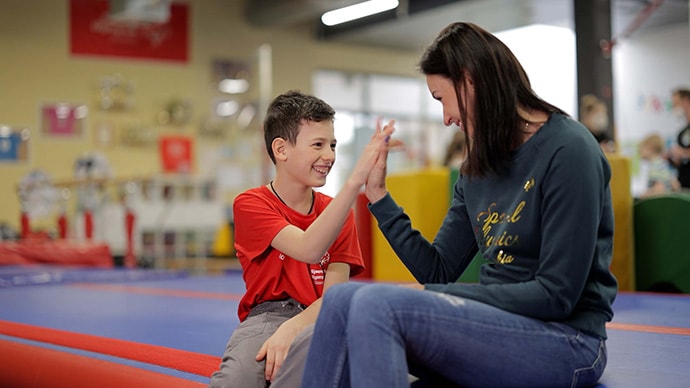
Unified with Refugees programme: SO Slovakia National Director, Eva Gazova, with Makar, young Ukranian refugee welcomed in Slovakia – March 2022. Photo: Special Olympics
But what Evangelista is most proud of is the Special Olympics Unified for Refugees program, which he started in collaboration with Lions Clubs International Foundation in 2016.
“And I remember watching the news, the mass migration of people fleeing violence and poverty, saying to myself: you know, of those millions of people coming over these borders, there’s got to be individuals with intellectual disabilities, and we need to be supportive. There’s nothing in our bylaws that says that they need to come from a specific zip code. Our mandate is to support people with intellectual disabilities, period.”
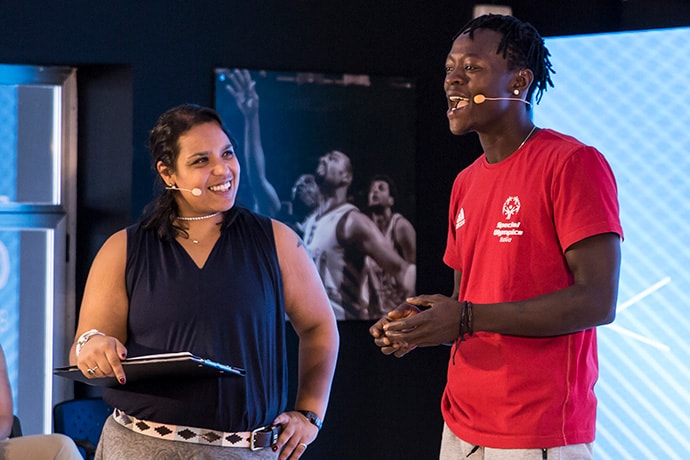
Special Olympics Advisor and advocate for Unified with Refugees programme Gerald Mballe as SO Ambassador for SO Italy. Photo: Special Olympics
Evangelista knew from his study of Eugenics at American University that an unfortunate legacy of defectology still requires dismantling to this day. This is especially true throughout Eastern Europe and Central Asia. The decades-long system of institutionalizing individuals with intellectual disabilities is a significant challenge and Evangelista believes that the use of grass-roots, inclusive sports offers an effective, efficient and compelling antidote.
Now, with the war in Ukraine, Unified for Refugees work is distinctly poised to help people with intellectual disabilities who are fleeing the conflict.
In many cases, Evangelista explained, they will get referred to Special Olympic National organizations, through sports clubs that are uniquely and exclusively created for Ukrainian refugees with intellectual disabilities to become fully-fledged Special Olympic athletes.
Special Olympics Slovakia has started a day center specifically for Ukrainian refugees with intellectual disabilities, including dedicated sports clubs. Special Olympics Romania has a national network of activities and supporters ready to help provide social integration through sport. Special Olympics Poland supports the upwards of 12,000 refugees through clothes, emergency care, and sports equipment. Special Olympics Moldova, together with the Moldova Football Federation, provides providing weekly football camps for refugee children from Ukraine to help support their social integration.
David Wu, President & CEO of Special Olympics Washington, reflects, “David and I connected immediately around the deep belief that sports build leaders and the refugee effort. That same desire to reach our local refugee communities and build leaders is a wonderful global-to-local connection. Our Unified Cities Schools program is working with the Kent Co School District and many athlete leaders to create an inclusive environment for one of the most diverse refugee communities in Washington State. This April, Special Olympics Washington will also integrate our health clinic program into this effort to bring wrap-around services to people with and without IDD.”
Welcome New Members
Please welcome our newest Global Washington members. Take a moment to familiarize yourself with their work and consider opportunities for support and collaboration!
Coevolution
A leadership and teaming development company with a mission to cultivate leadership capacity for positive social and climate impact in the World. ourcoevolution.com
DE Design & Environment
DE is a design and environmental consultancy and technology company focused on providing scientific and creative expertise to professional organizations to improve environmental performance and enhance their cultural communication related to sustainability. Design-environment.com
Global Mentorship Initiative
GMI enables refugees and underserved students to launch a successful career through mentorship. GMI was created to help prepare underserved youth for their first career job through a structured, short-term, online mentorship. Launched in 2020, GMI has over 6,000 students and mentors and works with 45 universities and youth associations in 92 countries including eight refugee camps across Africa, Lebanon, and displaced Ukrainian students. globalmentorship.org
Give2Asia
Based in the San Francisco Bay Area, Give2Asia is an international nonprofit that serves as a strategic partner and ally working on the ground in more than 23 countries across the Asia Pacific. Our role is to strengthen the work of local organizations and mobilize support through philanthropic giving from Individuals, Family Foundations, and Corporations. Give2asia.org
Jewish Humanitarian Response
JHR has been active since August 2021, providing relief, rescue, and resettlement to vulnerable Afghans facing inhumane living conditions and threats under the Taliban. Jhr.ngo
Panorama
Panorama is a platform for social change driven by audacious thinking, radical collaboration, and bold action. We help our partners navigate multiple pathways from vision to impact based on their needs. panoramaglobal.org
Spoon Foundation
SPOON’s mission is to nourish children who are highly vulnerable to malnutrition by empowering their caregivers around the globe. spoonfoundation.org
University of Washington School of Law – Sustainable International Development Graduate Program
The SID LL.M. program prepares students to work within organizations that include the World Bank, USAID, the United Nations development program, private consulting firms, environmental NGOs, humanitarian and human rights organizations and active military service focused on the rule of law. www.law.uw.edu/academics/llm/sustainable-development
USA for UNHCR
The United Nations High Commissioner for Refugees is a United Nations agency mandated to aid and protect refugees, forcibly displaced communities, and stateless people, and to assist in their voluntary repatriation, local integration or resettlement to a third country. Unrefugees.org
Member Events
March 30, 2023 Ukraine and Russia: A Conversation with Ambassador Marie Yovanovitch – 7:30 pm
May 25, 2023 Maximize Life Gala – The Max Foundation – All day
June 24, 2023 World Refugee Day – Global Village Festival – 12:00 pm
Career Center
Senior Communications Manager, SightLife / HCP Cureblindness
Chief Development Officer, SightLife / HCP Cureblindness
Forester / Technical Manager, Earthworm Foundation
Member Manager, Earthworm Foundation
Development & Administrative Assistant, Amplio
Engagement Manager, Linksbridge
Trainee Consultant, Linksbridge
Deputy Director, Forest Stewardship Council
Fund Development and Communications Coordinator, Mona Foundation
Programs Coordinator, The Max Foundation
Patient Navigator, The Max Foundation
Administrative Assistant, Center for Vaccine Innovation and Access, PATH
Associate, Grants and Contracts, VillageReach
Check out the GlobalWA Job Board for the latest openings.